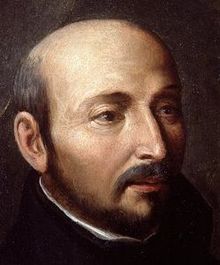Duluth, Minnesota (OpEdNews) June 19, 2022: The German historian Markus Friedrich (born in 1974), professor of early modern history at the University of Hamburg, which he defines as "from roughly 1500 to 1800" (p. 14), is the author of the new 2022 book in English translation, The Jesuits: A History, translated by John Noel Dillon (Princeton University Press; orig. German ed. 2016). It is a fast-paced, massively footnoted overview account of the history of the Society of Jesus (known informally as the Jesuit order). But I would like to have seen a more detailed table of "Contents" (p. vii) that included all the subheadings in each chapter.
Disclosure: I was in the Jesuits (1979-1987). In my first year of the two-year Jesuit novitiate, I made a 30-day directed retreat in silence (except for the daily conferences with the retreat director) following the Spiritual Exercises of the Spanish Renaissance mystic St. Ignatius Loyola (1491-1556), the found and first superior general of the Society of Jesus (known informally as the Jesuit order) - an office he held for sixteen years, until his death in 1556. It was one of the most memorable experiences of my life. Years after I left the Jesuit order, the cardinal-electors in the Roman Catholic Church elected the first Jesuit pope, Pope Francis, in March 2013. His election reinvigorated my interest in the Roman Catholic Church.
For my profile of the doctrinally conservative Pope Francis, see my OEN article "Pope Francis on Evil and Satan" (dated March 24, 2019):
Now, in Friedrich's "Prologue: Ignatius of Loyola Founds an Order" (pp. 1-19), he says that his "chapters stand on the shoulders of an immense body of literature. The body of scholarship on the Society of Jesus is completely unmanageable, particularly since it frequently is dedicated to local or regional contexts" (p. 19). He also says, "Only in recent decades has interest in the Jesuit order grown significantly outside the narrow confines of ecclesiastical and historical circles" (p. 19). In addition, he says, "Most scholarly works on the Society of Jesus today are written by historian approaching the society [of Jesus] with new questions. It goes without saying that the society of Jesus is now regarded as a serious subject of historical study, which has helped us understand many aspects of early modern and modern history" (p. 19).
Now, Friedrich's text is peppered with superscript numerals that the interested reader can look up in the brief bibliographic "Notes" (pp. 679-750) that are keyed to the complete bibliographic references in the "Works Cited" (pp. 751-828). Friedrich's book also includes a "Names Index" (pp. 829-843) and a "Subject Index" (pp. 845-854) - both of which are extremely helpful to have available.
Friedrich's "Prologue: Ignatius of Loyola Founds an Order" (pp. 1-19) contains 13 superscript numerals.
Friedrich's Chapter 1: "The Inner Life and Structure of the Society [of Jesus]" (pp. 20-130) contains 365 superscript numerals.
Friedrich's Chapter 2: "The Society [of Jesus], the Churches, and the Faithful" (pp. 131-259) contains 606 superscript numerals.
Friedrich's Chapter 3: "Saeculum and the Kingdom of God: The Jesuits 'in the World'" (pp. 260-426) contains 620 superscript numerals.
Friedrich's Chapter 4: "The Global Society" (pp. 427-574) contains 490 superscript numerals.
Friedrich's Chapter 5: "A World without the Society of Jesus: Hostility, Suppression, Revival" (pp. 575-620) contains 175 superscript numerals.
Friedrich's "Epilogue: The Modern Society [of Jesus]" (pp. 621-671) contains 207 superscript numerals.
That's a grand total of 2,476 superscript numerals in the text and correspondingly numbered "Notes."
(Note: You can view every article as one long page if you sign up as an Advocate Member, or higher).





